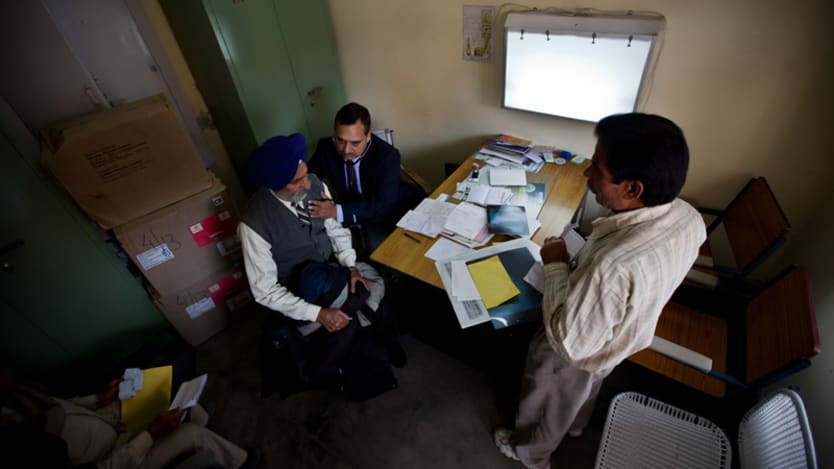
Last month, India’s finance minister announced the government’s plan to eliminate tuberculosis by 2025 during the unveiling of the country’s Union Budget for 2017-2018. This is a welcome move: While ridding people of the burden of any disease is a worthy goal by itself, TB elimination provides perhaps one of the strongest economic cases for public intervention.
All communicable diseases present what economists call externalities: infectious people can infect other people who in turn infect others and so on. In fact, economist Phillip Musgrove used TB in particular to illustrate this: “no victim of tuberculosis is likely to ignore the disease, so there is no problem of people undervaluing the private benefits of treatment. Rather, the cost of treatment — and the fact that they may feel better even though the disease has not been cured — may lead people to abandon treatment prematurely, with bad consequences not only for themselves but for others. The rest of society therefore has an interest in treating those with tuberculosis, and assuming at least part of the cost.”
Reducing TB incidence could generate benefits of $33 per dollar spent. The Economist to put TB among their list of no-brainers. According to the Stop TB Partnership, ending TB globally could yield $1.2 trillion in overall economic return on investment.
See more stories on tuberculosis:
► Opinion: Tuberculosis is a forgotten priority for child health
► 4 lessons learned tackling tuberculosis in Syria
► The right dose, the right chance: India's battle with drug-resistant TB
Given the public health importance of TB, all governments must take an active interest in ensuring people are diagnosed early and complete the treatment. With TB, mere coverage of services is not sufficient. Quality of TB care matters, in both the public and private sector. Despite the fact that the Indian government provides TB diagnosis and treatment free of cost in public health facilities, 1.3 of the 2.8 million TB cases in India are treated in the private sector. To add a further complication, patients who either do not get the right course of treatment or do not complete it not only remain infectious and face the risk of relapse, but they may also develop resistance to the most common TB drugs, adding a new layer of extraordinary cost to a less-effective treatment.
Three weeks after the bold target of eliminating TB in India by 2025 was announced, India’s Revised National TB Control Program published a draft of a new National Strategic Plan for TB Elimination 2017-2025 — which if approved, funded, and fully implemented, could be a game change in the fight against TB in India. The plan recognizes that we need to strengthen the RNTCP to improve services and outcomes for the 1.5 million patients it treats in the public system. We also need to reach out to private providers and provide support to the millions of patients treated in the private sector.
To effectively tackle TB, we need to provide incentives to providers to follow standard protocols for diagnosis and treatment and to notify cases to the government — which the NSP proposes to do, building on promising pilot results. Patients notified to the government will in turn receive a cash transfer to compensate them for the direct and indirect costs of undergoing treatment, as well as incentives to complete treatment. Being notified will also allow the government to provide home visits and counseling and to implement preventive interventions.
While critics will argue that the proposals of the new NSP have risks and have never been tried at the scale that is proposed in India, the stakes are too high for business as usual approaches. Consider the toll TB takes on Indians. India accounts for 27 percent of the world’s 10.4 million new TB cases, and 29 percent of the 1.8 million TB deaths globally. TB is one of the top five causes of death between the age of 30 to 69. Most TB deaths in India occur among young adults in the economically productive age group, with high economic and social costs. In 2006, TB caused India to lose an estimated $23.7 billion, and patients often deal with catastrophic out-of-pocket expenditure.
The cost of implementing the new NSP is estimated at $2.5 billion over the first three years, a steep increase over the current budget. Historically, despite being a highly cost-effective program, and despite having a high absorptive capacity, RNTCP has struggled to receive funding that is commensurate with the scale of India’s epidemic. This simply cannot continue. India must start backing its ambitions with rupees. Therefore, the real test of whether the bold plan by the Health Ministry can be implemented and the ambitious target set by the Finance Ministry achieved will be whether enough resources can be mobilized to find, treat and offer quality care to all TB patients, regardless of where they seek care.
Note: Views and opinions expressed in this opinion piece are the sole responsibility of the authors and do not necessarily represent the views of the World Bank.
Join the Devex community and access more in-depth analysis, breaking news and business advice — and a host of other services — on international development, humanitarian aid and global health.









